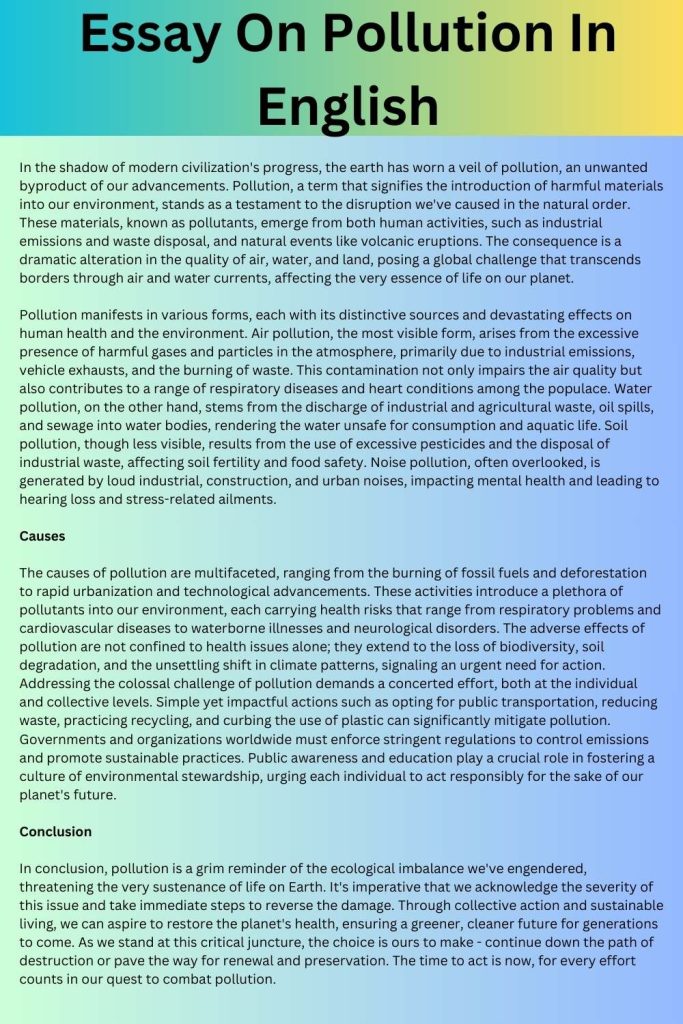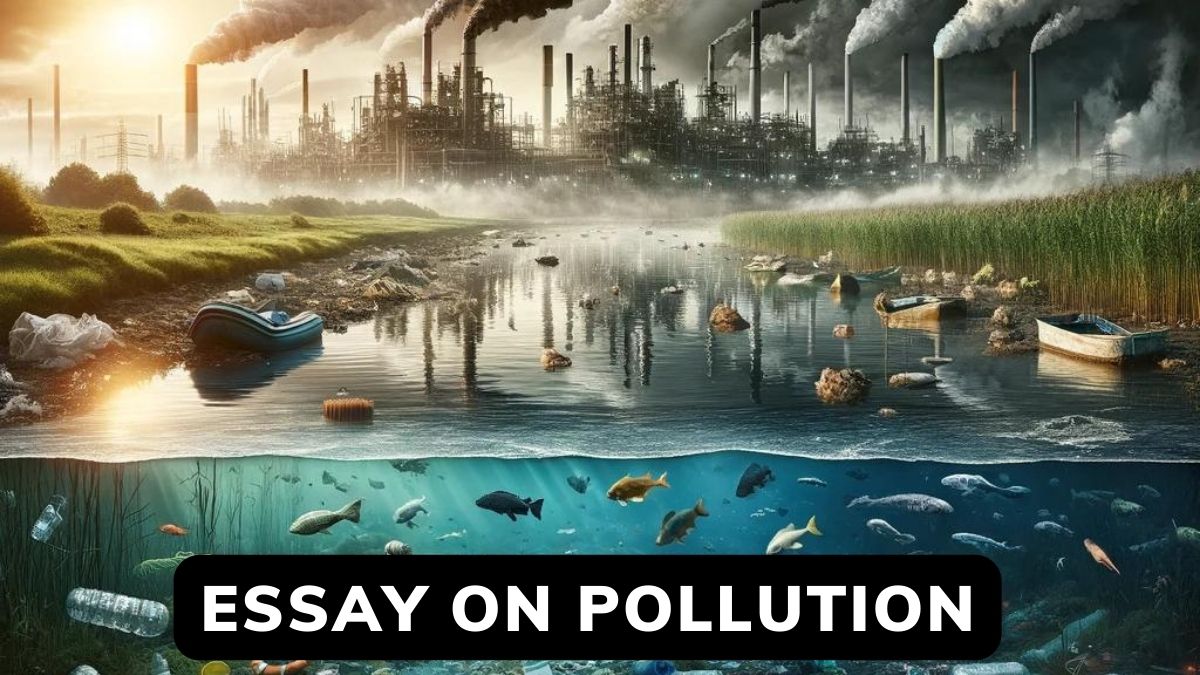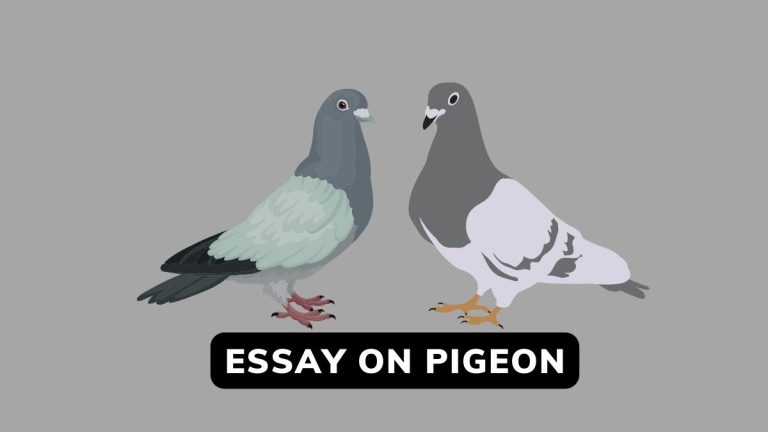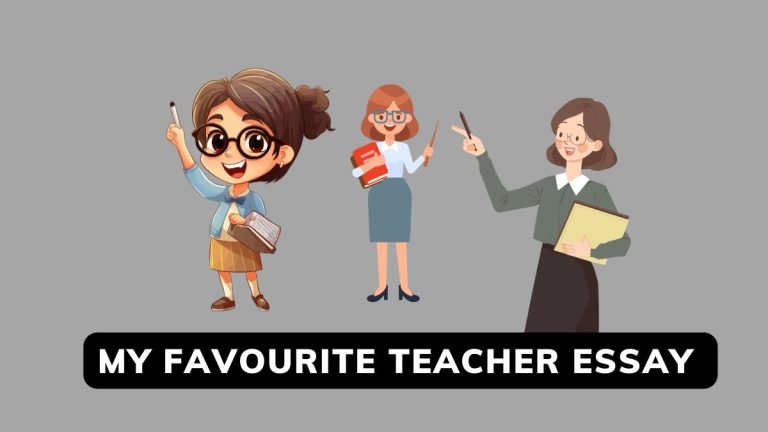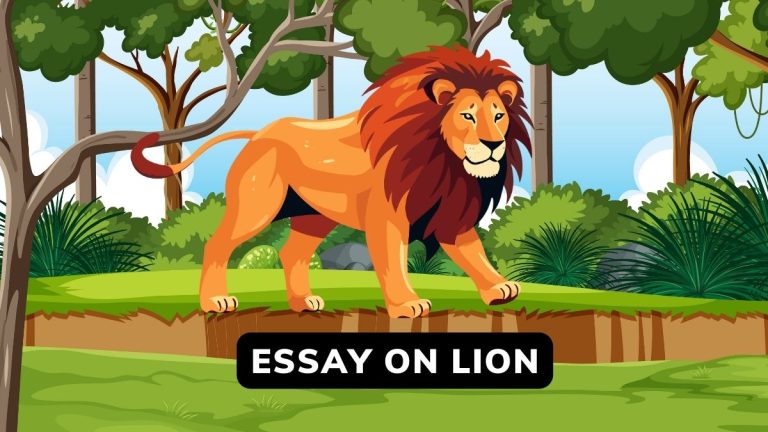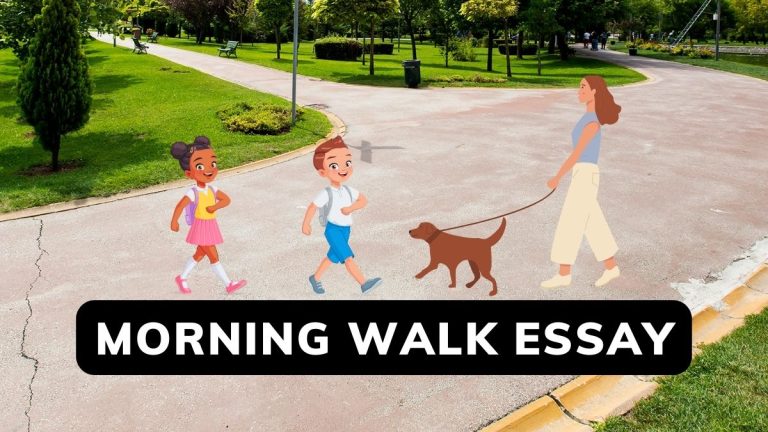Essay On Pollution 100,150,200,250,300, Words And Classes 3 to 10
Picture a world where the air, water, and land around us are pristine and full of life. Now contrast that with the reality of pollution, a pervasive force that transforms our environment into a less hospitable place for all living beings. This introduction sets the stage for students across classes 3 to 10 to delve into essays on pollution, ranging from brief 100-word pieces to more comprehensive 300-word explorations.
Through these essays, students will embark on a journey to uncover the impacts of pollution, learn about its various forms, and discover actionable steps to mitigate its effects. As we transition into this exploration, remember that understanding pollution is the first step toward creating a cleaner, healthier planet for future generations.
Essay On Pollution In 100 Words
Pollution, the intrusion of harmful substances into our environment, poses a significant threat to the planet’s health and its inhabitants. Manifesting as air, water, soil, and noise pollution, it originates from industrial activities, vehicle emissions, excessive use of pesticides, and urbanization. The repercussions of pollution are profound, leading to health issues like respiratory problems, and cardiovascular diseases, and impacting the ecosystem’s balance. Collective action is imperative to combat pollution. Simple measures such as recycling, using public transport, and reducing waste can make a substantial difference. It’s our responsibility to act now to ensure a healthier, sustainable future for the earth and its diverse life forms. Every small step towards reducing pollution contributes to a cleaner, greener planet.
Essay On Pollution In 150 Words
Pollution, a dire consequence of human activity, has cast a shadow over the earth’s natural beauty and balance. It manifests in various forms: air, water, soil, and noise pollution, each stemming from industrial emissions, waste disposal, excessive use of chemicals, and urban noise. The impact of pollution is vast, affecting not only human health through diseases like asthma, cardiovascular issues, and waterborne illnesses but also harming wildlife, aquatic ecosystems, and the environment at large.
The urgent need to address pollution calls for collective action from individuals, communities, and governments worldwide. Simple yet impactful measures such as recycling, minimizing waste, using public transport, and advocating for green policies can make a significant difference. As we strive to mitigate the effects of pollution, it’s crucial to remember that a cleaner, healthier planet is not just a benefit for ourselves but a legacy for future generations. The time to act is now; every effort counts towards curbing the pollution menace and fostering a sustainable future.
Essay On Pollution In 200 Words
Pollution, an alarming environmental issue, manifests through the contamination of air, water, soil, and noise, significantly impacting the planet and the health of its inhabitants. This pervasive problem arises from industrial emissions, vehicle exhaust, improper waste disposal, and excessive chemical usage in agriculture, leading to a host of adverse effects on human health, including respiratory ailments, cardiovascular diseases, and other serious health conditions. Moreover, pollution endangers wildlife, disrupts ecosystems, and contributes to the escalating crisis of climate change.
Addressing pollution requires immediate and collective efforts from individuals, communities, and governments. Simple yet impactful actions can significantly mitigate pollution’s effects. Recycling, minimizing waste, opting for public transportation, and conserving energy are steps everyone can take to reduce their environmental footprint. Additionally, supporting policies that aim to reduce emissions and regulate waste management is crucial for making broader changes.
The fight against pollution is not just an environmental concern but a necessity for ensuring public health and preserving the planet for future generations. By adopting sustainable practices and advocating for effective pollution control measures, we can work towards a cleaner, healthier world. The time to act is now; each step we take towards combating pollution paves the way for a greener future.
Essay On Pollution In 250 Words
Pollution, the introduction of harmful substances into our environment, poses one of the greatest challenges to the planet’s health and the well-being of its inhabitants. From the air we breathe to the water that sustains life, pollution pervades every aspect of the natural world, disrupting ecosystems and contributing to a host of health problems. It manifests in various forms, each with distinct causes and dire consequences. Air pollution, primarily from industrial emissions and vehicle exhaust, fills our atmosphere with dangerous particulates and gases, leading to respiratory diseases and contributing to the phenomenon of climate change. Water pollution, resulting from the discharge of industrial waste, pesticides, and untreated sewage into our water bodies, compromises the quality of our drinking water and threatens aquatic life. Soil pollution, through excessive use of chemicals and waste disposal, degrades the land’s fertility, affecting food production and safety.
The repercussions of pollution are far-reaching, impacting not only human health with conditions such as asthma, cardiovascular diseases, and waterborne illnesses but also leading to the loss of biodiversity, soil degradation, and a disturbing alteration in climate patterns. These effects underscore the urgent need for action to address this global menace.
Combating pollution requires collective efforts at both the individual and global levels. Simple actions like reducing waste, recycling, using public transport, and conserving energy can significantly mitigate pollution’s impact. Moreover, stricter regulations and enforcement by governments, alongside public awareness and education campaigns, are crucial in curbing pollution’s advance. The fight against pollution is not just about preserving the environment; it’s about ensuring a healthy, sustainable future for generations to come. The time to act is now, as every step taken towards reducing pollution paves the way for a cleaner, greener planet.
Essay On Pollution In 300 Words
Pollution, a pervasive environmental nemesis, casts a long shadow over our planet’s health and the well-being of all its inhabitants. Manifesting in various forms—air, water, soil, and noise pollution—it stems from a multitude of human activities: industrial operations spewing toxic emissions, vehicles belching noxious fumes, rampant use of pesticides and fertilizers, and the incessant hum and clamor of urban life. These pollutants not only degrade the quality of our natural resources but also pose severe health risks, including respiratory diseases, heart conditions, and a spectrum of other ailments.
The consequences of pollution extend beyond human health, affecting biodiversity, altering ecosystems, and contributing to the grave challenge of climate change. Water bodies choked with industrial waste and plastic refuse endanger aquatic life, while polluted air and soil threaten the survival of countless species, undermining food chains and ecological balance.
Combatting this global menace necessitates a multifaceted approach, encompassing individual actions and collective policy interventions. Individuals can contribute by adopting eco-friendly practices: recycling and reducing waste, choosing sustainable modes of transportation, and conserving energy. Moreover, advocating for and supporting environmental policies that aim to reduce emissions, regulate industrial waste, and promote renewable energy sources is crucial.
However, the fight against pollution is not a solitary journey but a collective endeavor that requires global cooperation. International agreements and local initiatives must work in tandem to address this issue comprehensively. Education and awareness play pivotal roles in this battle, empowering people to make informed decisions and take responsible actions towards a more sustainable future.
In conclusion, pollution is an urgent challenge that demands immediate and sustained efforts from every sector of society. As stewards of the earth, it is our responsibility to safeguard the environment and ensure a healthy, viable planet for generations to come. Through concerted action, innovation, and commitment, we can stem the tide of pollution and pave the way for a cleaner, greener world.
Essay On Pollution For Class 3
Pollution is when the Earth gets dirty from things like smoke, trash, and chemicals. It can happen in the air, water, and on land. It’s not good for our planet or for us to breathe dirty air or drink dirty water.
Air pollution happens when cars, factories, and other things put smoke and gases into the air. This makes it hard for us to breathe and can make us sick.
Water pollution happens when trash and chemicals get into rivers, lakes, and oceans. This makes the water dirty and can harm fish and other animals that live in the water. It’s also not safe for us to drink this water.
Land pollution happens when people throw trash on the ground instead of putting it in the trash can. This can make the earth dirty and can hurt plants and animals.
We can help stop pollution by doing simple things. We can use less plastic, recycle things like paper and bottles, and not throw trash on the ground. We can also turn off lights when we leave a room to save energy.
Everyone needs to help clean up our Earth so it can be a beautiful and safe place for us and all living things. Let’s take care of our planet together.
Essay On Pollution For Class 4
Pollution is when harmful things get into our air, water, or land, making them dirty and unsafe. Imagine our earth is like a big house. If we keep throwing trash everywhere inside our house, it will become dirty and we might get sick. That’s what happens to our earth when it gets polluted.
There are different kinds of pollution. Air pollution happens when cars and factories put smoke and gases into the air. This can make it hard for us to breathe and can harm birds and animals too.
Water pollution is when waste from homes, factories, and farms goes into rivers, lakes, and oceans. This can kill fish and plants that live in water and make the water unsafe for us to drink or swim in.
Soil pollution happens when harmful chemicals from trash and pesticides make the ground dirty. This can make it hard to grow healthy fruits and vegetables.
Noise pollution is not about dirt but about too much sound from cars, machines, and loud music, making it hard to concentrate or sleep.
We can help reduce pollution by doing simple things like recycling our trash, using less plastic, planting trees, and not wasting water. If everyone helps a little, our earth can be cleaner and healthier for all of us to live in.
So, let’s promise to take care of our earth by keeping it clean and safe. By doing our part, we can make a big difference.
Essay On Pollution For Class 5
Pollution is like a monster that’s making our beautiful Earth sick. It happens when harmful things get mixed into the air we breathe, the water we drink, and the soil where plants grow. Pollution is bad for people, animals, plants, and everything living on our planet.
There are a few types of pollution we should know about:
- Air Pollution: This is when the air gets dirty because of smoke from cars, buses, factories, and even burning trash. It can make it hard for us to breathe and cause sickness.
- Water Pollution: Imagine our rivers, lakes, and oceans getting filled with garbage, oil, and chemicals. It harms the fish and animals living in the water and makes the water unsafe for us to use.
- Soil Pollution: This happens when harmful chemicals get into the ground. It can come from throwing away garbage just anywhere, using too many pesticides on farms, or factories dumping their waste. This makes it hard to grow healthy fruits and vegetables.
- Noise Pollution: This isn’t about dirt but about too much noise from cars, machines, and loud music. It can make it hard for us to concentrate on our studies and can even make animals scared and run away from their homes.
Everyone has a role in combating pollution! Here are some actions we can adopt:
- Recycle things like paper, plastic, and metal instead of throwing them away.
- Use fewer plastic bags and bottles.
- Plant more trees because they help clean the air.
- Turn off lights and electronics when we’re not using them to save energy.
- Walk, ride a bike, or use public transportation instead of always asking for a car ride.
By doing these simple things, we can all help make our planet cleaner and safer for everyone. Let’s all be Earth’s superheroes and fight pollution together.
Essay On Pollution For Class 6
Pollution is a big problem for our planet, Earth. It means making our environment dirty and not safe for us and animals to live in.
There are several types of pollution. Air pollution happens when harmful gases, smoke, and dust get into the air, making it dirty. This can come from cars, factories, and even burning trash. It can make us sick, causing problems like asthma and heart disease.
Water pollution happens when waste, chemicals, and other harmful substances get into rivers, lakes, and oceans. This can kill fish and other creatures that live in water and make the water unsafe for us to use or drink.
Soil pollution occurs when chemicals from pesticides and waste contaminate the ground. This can make it hard to grow healthy plants and can harm animals that live in the soil.
Noise pollution is different because it’s about unwanted or harmful sounds, like loud music, traffic, and industrial noise. It can make it hard for us to concentrate, sleep, and can even affect our hearing.
We can all help reduce pollution by doing simple things. We can recycle and reuse things instead of throwing them away, use less plastic, save electricity by turning off lights when we don’t need them, and use public transport or walk instead of using cars all the time. Planting trees and taking care of plants can also help because they clean the air.
It’s important for everyone to work together to fight pollution. If we all do our part, we can make our planet a cleaner, healthier place to live for us and all the animals too. Let’s protect our Earth from pollution!
Essay On Pollution For Class 7
Pollution is a big problem for our planet. It happens when harmful substances get into our environment, making it dirty and dangerous for living things. There are several types of pollution, including air, water, soil, and noise pollution, each affecting our health and the health of our planet in different ways.
Air pollution is caused by smoke and gases from cars, factories, and burning trash. It can make it hard for us to breathe and cause diseases like asthma. Water pollution happens when waste from homes, factories, and farms ends up in rivers, lakes, and oceans, harming the animals that live in the water and making the water unsafe for us to use. Soil pollution occurs when chemicals from pesticides and industrial waste make the ground toxic, affecting the plants that grow in it and the animals that rely on those plants for food. Noise pollution comes from loud sounds in our surroundings, like traffic, construction, and loud music, which can affect our hearing and make it hard for us to concentrate.
But, there is good news! We can all help reduce pollution. Here are some simple steps we can take: using less plastic by choosing reusable bags and bottles, recycling paper, glass, and plastic to keep them out of landfills, saving energy by turning off lights and electronics when we’re not using them, and walking, biking, or using public transportation instead of cars to reduce air pollution.
By making small changes in our daily lives, we can make a big difference in reducing pollution and helping our planet stay healthy and beautiful for future generations. Let’s all do our part to keep our Earth clean.
Essay On Pollution For Class 8
Pollution, a dire environmental crisis, casts a shadow over our planet’s future. Pollution can take the form of chemical substances or energy, such as noise, heat, or light. As students of class 8, it’s crucial to understand the various types of pollution and their significant impact on our health and the environment.
Air pollution is one of the most visible forms of pollution, caused by the release of chemicals and particulates into the atmosphere. Major sources include industrial activities, vehicle emissions, and the burning of fossil fuels like coal and oil. This type of pollution can lead to respiratory diseases, heart conditions, and can even affect the brain.
Water pollution occurs when harmful substances—chemicals, waste produced by industries, and pesticides from agricultural runoff—enter water bodies such as rivers, lakes, and oceans, making them toxic for marine life and humans. It leads to the destruction of aquatic ecosystems and poses severe risks to drinking water quality.
Soil pollution is often caused by industrial waste disposal, harmful agricultural practices, and accidental oil spills. This can result in decreased soil fertility, affecting food production and plant life. Moreover, the toxic substances can enter the food chain, posing health risks to animals and humans.
Noise pollution, though less discussed, is equally harmful. It arises from industrial operations, loud music, traffic, and other sources of loud noises that disrupt the balance of life, leading to stress, hearing loss, and wildlife disturbances.
The fight against pollution is not just the responsibility of governments and organizations but also of individuals. Simple actions such as reducing waste, recycling, using public transport, and conserving energy can make a big difference. Planting trees and supporting green spaces are also effective ways to combat air pollution.
As class 8 students, we stand at the threshold of becoming responsible citizens of the world. Understanding pollution and taking proactive steps towards its reduction can help ensure a healthier planet for ourselves and future generations. It’s time to act now; every small step towards a sustainable lifestyle counts in the battle against pollution.
Essay On Pollution For Class 9
Pollution is an alarming environmental issue that engulfs our planet today, posing serious threats to ecosystems, human health, and future generations. It’s the introduction of harmful substances or products into the environment, resulting in adverse effects on the living and non-living components of the earth. As students stepping into class 9, it’s imperative to delve deeper into understanding the various facets of pollution, its causes, effects, and the measures we can adopt to mitigate its impact.
There are several types of pollution, each with distinct sources and consequences. Air pollution, primarily caused by industrial emissions, vehicle exhausts, and the burning of fossil fuels, leads to respiratory ailments, cardiovascular diseases, and contributes significantly to global warming. Water pollution, resulting from industrial discharges, agricultural runoff, and untreated sewage, affects marine life and contaminates our drinking water sources, leading to serious health issues like cholera and hepatitis. Soil pollution, on the other hand, is often a result of chemical spills, industrial waste disposal, and excessive use of pesticides and fertilizers, reducing soil fertility and contaminating the food chain. Noise pollution, though less tangible, results from loud industrial and urban noises, affecting human health by causing stress, hearing loss, and sleep disturbances.
The ramifications of pollution extend beyond immediate health concerns. They disrupt ecosystems, lead to loss of biodiversity, and exacerbate climate change, posing long-term consequences for the planet’s sustainability. It’s crucial for us, especially as young learners, to recognize our role in contributing to and mitigating pollution. Simple yet effective actions such as reducing waste, practicing recycling, conserving energy, and promoting the use of renewable resources can make a significant difference.
Moreover, raising awareness about the importance of environmental protection, advocating for stricter pollution control policies, and participating in or organizing clean-up drives in our communities are vital steps towards a cleaner and greener environment.
As class 9 students, we are on the brink of becoming future leaders, scientists, policymakers, and informed citizens. It’s our responsibility to not only educate ourselves about the pressing issue of pollution but also to take actionable steps towards its reduction. By adopting sustainable practices and encouraging others to do the same, we can collectively work towards mitigating pollution and safeguarding our planet for future generations. The fight against pollution is not an option but a necessity, and it starts with us.
Essay On Pollution For Class 10
As we step into class 10, our understanding of the world around us deepens, including our grasp of complex issues such as pollution. Pollution, in its broadest sense, is the contamination of our environment through substances that cause harm or discomfort to the ecosystem, including humans, wildlife, and natural resources. It’s a global scourge with local impacts, affecting every corner of our planet, from the air we breathe to the water we drink and the soil that nurtures our food.
Pollution manifests in various forms: air, water, soil, and noise, each with its unique sources and devastating effects. Air pollution, primarily resulting from the burning of fossil fuels, industrial emissions, and vehicular exhaust, contributes to respiratory diseases, heart conditions, and is a leading driver of climate change. Water pollution, caused by industrial waste, agricultural runoff, and sewage discharge, leads to the deterioration of aquatic ecosystems and poses significant health risks to humans through contaminated drinking water. Soil pollution, often the result of chemical spills, industrial activities, and improper waste disposal, compromises the integrity of our food chain and agricultural productivity. Noise pollution, a less visible but pervasive form, arises from urban development, transportation networks, and industrial activities, impacting human well-being and wildlife.
The consequences of pollution are profound and far-reaching, affecting not just human health but also the planet’s biodiversity and climate. The alarming rate of species extinction, loss of habitats, and the escalating crisis of global warming are direct outcomes of unchecked pollution.
As class 10 students, we are at a pivotal juncture where we can lead by example and contribute to the fight against pollution. Simple actions such as reducing waste, practicing recycling, conserving energy, and using public transport can collectively make a significant impact. Furthermore, educating ourselves and others about the importance of sustainability, advocating for policies that reduce pollution, and participating in environmental conservation efforts are vital steps towards a cleaner, healthier planet.
We bear the responsibility to act as stewards of the environment, ensuring that the beauty and bounty of our planet are preserved for future generations. It requires a concerted effort from all sectors of society, including individuals, communities, businesses, and governments, to tackle pollution effectively. As we move forward, let us commit to being part of the solution, embracing sustainable practices, and advocating for a cleaner, greener world. The fight against pollution is not just an environmental issue; it’s a moral imperative for the survival and well-being of all life on Earth.
Essay On Pollution In English
In the shadow of modern civilization’s progress, the earth has worn a veil of pollution, an unwanted byproduct of our advancements. Pollution, a term that signifies the introduction of harmful materials into our environment, stands as a testament to the disruption we’ve caused in the natural order. These materials, known as pollutants, emerge from both human activities, such as industrial emissions and waste disposal, and natural events like volcanic eruptions. The consequence is a dramatic alteration in the quality of air, water, and land, posing a global challenge that transcends borders through air and water currents, affecting the very essence of life on our planet.
Pollution manifests in various forms, each with its distinctive sources and devastating effects on human health and the environment. Air pollution, the most visible form, arises from the excessive presence of harmful gases and particles in the atmosphere, primarily due to industrial emissions, vehicle exhausts, and the burning of waste. This contamination not only impairs the air quality but also contributes to a range of respiratory diseases and heart conditions among the populace. Water pollution, on the other hand, stems from the discharge of industrial and agricultural waste, oil spills, and sewage into water bodies, rendering the water unsafe for consumption and aquatic life. Soil pollution, though less visible, results from the use of excessive pesticides and the disposal of industrial waste, affecting soil fertility and food safety. Noise pollution, often overlooked, is generated by loud industrial, construction, and urban noises, impacting mental health and leading to hearing loss and stress-related ailments.
Causes
The causes of pollution are multifaceted, ranging from the burning of fossil fuels and deforestation to rapid urbanization and technological advancements. These activities introduce a plethora of pollutants into our environment, each carrying health risks that range from respiratory problems and cardiovascular diseases to waterborne illnesses and neurological disorders. The adverse effects of pollution are not confined to health issues alone; they extend to the loss of biodiversity, soil degradation, and the unsettling shift in climate patterns, signaling an urgent need for action.
Addressing the colossal challenge of pollution demands a concerted effort, both at the individual and collective levels. Simple yet impactful actions such as opting for public transportation, reducing waste, practicing recycling, and curbing the use of plastic can significantly mitigate pollution. Governments and organizations worldwide must enforce stringent regulations to control emissions and promote sustainable practices. Public awareness and education play a crucial role in fostering a culture of environmental stewardship, urging each individual to act responsibly for the sake of our planet’s future.
Conclusion
In conclusion, pollution is a grim reminder of the ecological imbalance we’ve engendered, threatening the very sustenance of life on Earth. It’s imperative that we acknowledge the severity of this issue and take immediate steps to reverse the damage. Through collective action and sustainable living, we can aspire to restore the planet’s health, ensuring a greener, cleaner future for generations to come. As we stand at this critical juncture, the choice is ours to make – continue down the path of destruction or pave the way for renewal and preservation. The time to act is now, for every effort counts in our quest to combat pollution.
Essay On Pollution PDF
